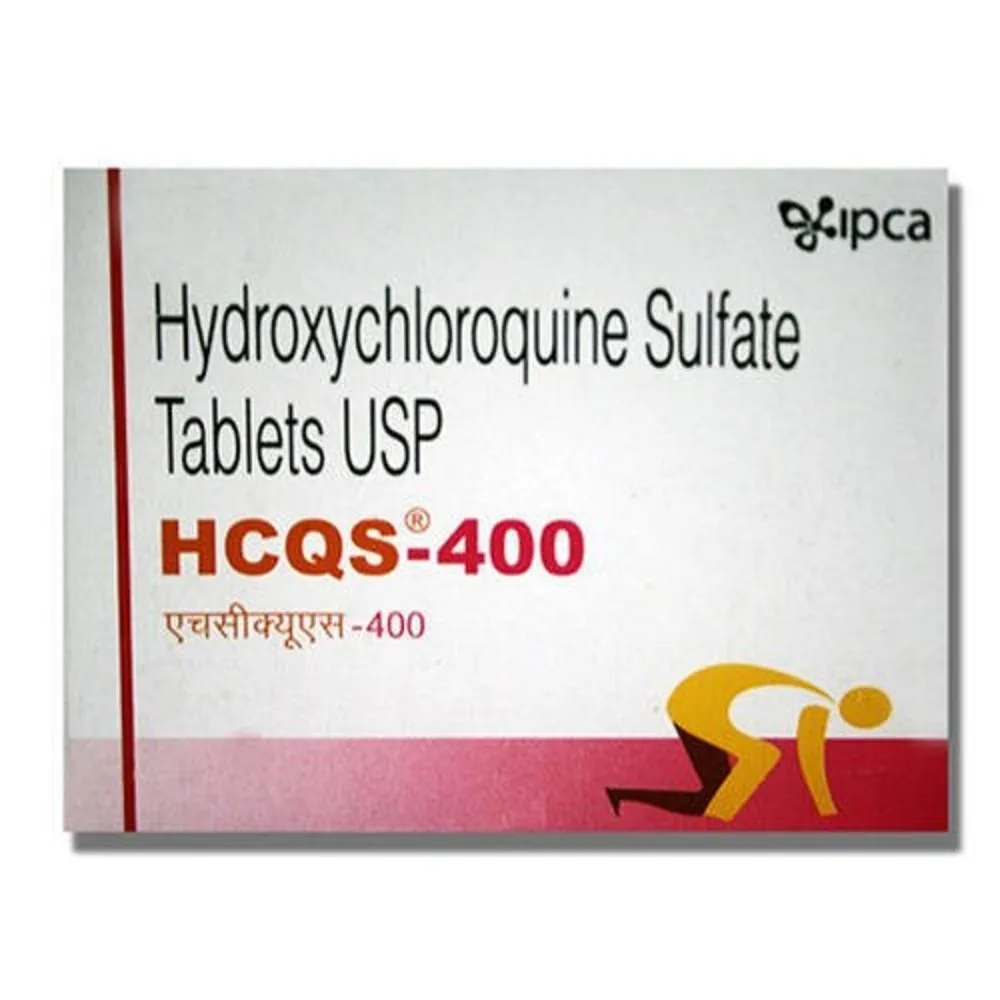“HCQS 400 mg Uncovered: Medical Applications, Dosage, and Patient Safety”
What is HCQS 400 Mg?
HCQS 400 mg is a prescription medication containing Hydroxychloroquine Sulfate, a synthetic antimalarial and immunomodulatory drug. It is primarily used in the treatment of autoimmune conditions such as rheumatoid arthritis (RA) and systemic lupus erythematosus (SLE), as well as for the prevention and treatment of malaria. HCQS is the Indian equivalent of Plaquenil, widely recognized for its anti-inflammatory and immunosuppressive effects.
Understanding HCQS 400 Mg: An Overview
Hydroxychloroquine works by:
- Modulating the immune system.
- Inhibiting toll-like receptor signaling pathways.
- Reducing inflammation.
- Disrupting antigen presentation and cytokine production.
Originally developed for malaria, hydroxychloroquine has shown therapeutic benefits in autoimmune and inflammatory diseases due to its ability to interfere with immune system hyperactivity.
Medical Uses and Applications
Approved and Common Uses:
- Malaria (Prophylaxis and Treatment) – Effective against Plasmodium species, particularly P. vivax and P. malariae.
- Rheumatoid Arthritis (RA) – Controls inflammation and reduces joint pain.
- Systemic Lupus Erythematosus (SLE) – Helps manage flare-ups and chronic symptoms.
- Discoid Lupus Erythematosus (DLE) – Especially useful in skin manifestations.
Investigational/Off-Label Uses:
- Sjögren’s syndrome
- COVID-19 (studied but not recommended due to lack of efficacy)
- Sarcoidosis and other connective tissue disorders
Administration and Dosage Guidelines
1. Administration Instructions
- Route: Oral (by mouth).
- Dosage form: Commonly available as 200 mg or 400 mg tablets.
- With Food: Take the medication with meals or a glass of milk to minimize gastrointestinal discomfort such as nausea or upset stomach.
- Swallow Whole: Tablets should be swallowed whole with water; do not crush, break, or chew.
- Consistency: Take doses at the same time every day to maintain steady blood levels and maximize effectiveness.
- Missed Dose:
- If you miss a dose, take it as soon as you remember unless it is almost time for your next dose.
- Do not double the dose to catch up.
2. Dosage Guidelines by Condition
a. Malaria
- Prevention (Prophylaxis):
- 400 mg once weekly, starting 1–2 weeks before entering an endemic area.
- Continue weekly treatment during exposure and extend it for four weeks after exiting the area.
- Treatment:
- Day 1: 800 mg (initial dose).
- Followed by 400 mg at 6 hours, 24 hours, and 48 hours after the initial dose.
b. Rheumatoid Arthritis (RA) and Systemic Lupus Erythematosus (SLE)
- Initial dose: 400–600 mg daily, typically divided into 1 or 2 doses.
- Maintenance dose: 200–400 mg daily, tailored to patient response.
- Duration: Usually long-term therapy under medical supervision.
- Note: Dosage may be adjusted based on weight and tolerance.
c. Other Autoimmune Diseases
- Dosing is similar to RA and SLE but individualized by the prescribing physician.
3. Weight-Based Dosing
- The recommended dose is approximately 5–6.5 mg/kg/day of hydroxychloroquine base, equivalent to about 6.5–8 mg/kg/day of hydroxychloroquine sulfate.
- It is important not to exceed 5 mg/kg/day of actual HCQ base to reduce the risk of retinal toxicity.
- For example, for a 70 kg adult, the maximum dose is around 350 mg of base per day.
4. Special Considerations
- Renal Impairment: Dose adjustment may be required; monitor closely for toxicity.
- Hepatic Impairment: Use with caution and under medical supervision.
- Elderly: May require dose adjustment due to changes in drug metabolism.
- Pediatrics: Dosing based on weight; prescribed carefully by a specialist.
5. Monitoring During Treatment
- Baseline ophthalmologic evaluation before starting therapy.
- Follow-up eye exams annually after 5 years or sooner in high-risk patients.
- Regular clinical monitoring for efficacy and side effects.
- Liver and kidney function may need to be evaluated through blood tests.
6. Patient Counseling Points
- Emphasize adherence to dosing schedule.
- Do not make any dose changes or stop the medication without consulting your physician.
- Report any vision changes or unusual symptoms immediately.
- Avoid self-medicating or sharing medication.
Safety Profile and Considerations
1. Common Side Effects
Hydroxychloroquine is generally well-tolerated, but like all medications, it may cause some adverse effects. Most are mild and transient:
- Gastrointestinal: Nausea, vomiting, abdominal discomfort, diarrhea
- Neurological: Headache, dizziness
- Dermatological: Rash, itching, skin pigmentation changes
- General: Fatigue, loss of appetite
These symptoms often improve with continued use or by taking the medication with food or milk.
2. Serious Adverse Effects
Though rare, some serious adverse effects require close monitoring:
a. Ocular Toxicity (Retinopathy)
- Risk: Long-term use or high cumulative doses can cause damage to the retina, potentially leading to irreversible vision loss.
- Manifestations: Blurred vision, difficulty reading, changes in color perception, visual field defects.
- Prevention:
- Baseline eye examination before starting HCQS.
- Annual ophthalmologic screening recommended after 5 years of use or earlier in high-risk patients (renal impairment, high doses, or pre-existing retinal disease).
- Immediate consultation if visual symptoms arise.
b. Cardiac Toxicity
- HCQS may cause QT interval prolongation, which can lead to arrhythmias.
- Risk increases when combined with other QT-prolonging drugs or in patients with heart conditions.
- Monitoring ECG may be advised in high-risk individuals.
c. Hypoglycemia
- Can cause dangerously low blood sugar levels, especially in diabetic patients or those taking hypoglycemic agents.
- Patients should monitor for symptoms such as dizziness, sweating, confusion, and seek medical advice if they occur.
d. Neuropsychiatric Effects
- Rare cases of mood changes, agitation, hallucinations, and psychosis have been reported.
- Patients with a history of psychiatric disorders should be closely observed.
e. Hematological Effects
- Rarely, it may cause blood disorders such as anemia, leukopenia, or thrombocytopenia.
3. Contraindications
- Known hypersensitivity to hydroxychloroquine or related compounds (chloroquine).
- Pre-existing retinal or visual field changes.
- Caution or contraindicated in patients with:
- Severe renal or hepatic impairment.
- Psoriasis or porphyria (may exacerbate symptoms).
- Glucose-6-phosphate dehydrogenase (G6PD) deficiency (risk of hemolysis).
4. Drug Interactions
- Antacids: May reduce absorption; separate dosing by at least 4 hours.
- Digoxin: HCQS may increase digoxin levels; monitor closely.
- Other QT-prolonging agents: Heightened risk of cardiac arrhythmias.
- Insulin and hypoglycemic drugs: May potentiate hypoglycemic effects.
- Use metformin and other diabetes treatments cautiously while keeping track of blood glucose.
5. Use in Special Populations
- Pregnancy: HCQS is considered relatively safe and may be continued if clinically necessary, but only under medical supervision.
- Breastfeeding: Excreted in breast milk in small amounts; usually considered safe but monitor infant for adverse effects.
- Pediatric Use: Used cautiously with appropriate dosing adjustments.
6. Monitoring and Precautions
- Regular ophthalmologic exams during long-term therapy.
- Monitor for signs of cardiac dysfunction if risk factors are present.
- Periodic blood counts to detect hematological abnormalities.
- Patient education about recognizing early signs of side effects and the importance of adherence.
7. Storage and Handling
- Store at room temperature (15°C–30°C or 59°F–86°F).
- Protect from light and moisture.
- Keep out of reach of children.
Patient Information and Support
Important Advice for Patients:
- Take the medication exactly as prescribed
- Have baseline and annual eye exams
- Inform your healthcare provider of any vision changes, hearing loss, or heart symptoms
- Preserve at standard room temperature, avoiding moisture and exposure to light.
- Avoid stopping HCQS without first speaking to your healthcare provider.
Drug Interactions:
- Antacids (separate doses by 4 hours)
- Digoxin
- Insulin or diabetes medications (may enhance hypoglycemic effects)
- Other QT-prolonging agents
Patient Support:
- Educational leaflets from your rheumatologist or pharmacist
- Online communities for lupus and RA patients
- Mobile apps to track symptoms and medications
Research and Future Directions
Hydroxychloroquine continues to be studied for:
- Autoimmune conditions: Broader application in mixed connective tissue disorders
- Cancer immunotherapy: Investigated for autophagy modulation
- Antiviral potential: Despite early interest in COVID-19, studies do not support routine use
- Combination therapies: With other immunosuppressants for enhanced efficacy in autoimmune disease
Researchers are particularly focused on developing safer formulations with less retinal risk and exploring biomarkers for predicting who will benefit most from treatment.
Conclusion
HCQS 400 mg is a versatile medication with established efficacy in managing autoimmune disorders and malaria. While generally well-tolerated, it requires careful monitoring—especially for ocular and cardiac side effects. When used under appropriate medical supervision, HCQS remains a cornerstone therapy in rheumatology and tropical medicine.






Leo (verified owner) –
Amazing results, feeling healthier every day.
Kai (verified owner) –
I’ve been struggling with low energy for a while, but this product has been a game-changer. I now feel more awake during the day and no longer need to rely on coffee. I’ve recommended it to all my friends.
Dominic (verified owner) –
I was skeptical at first, but after consistent use, I feel like a brand-new person. This medicine has helped regulate my blood pressure, and I haven’t felt this good in years. It’s definitely a must-have in my daily routine.
Kayden (verified owner) –
Supports overall wellness and mental clarity